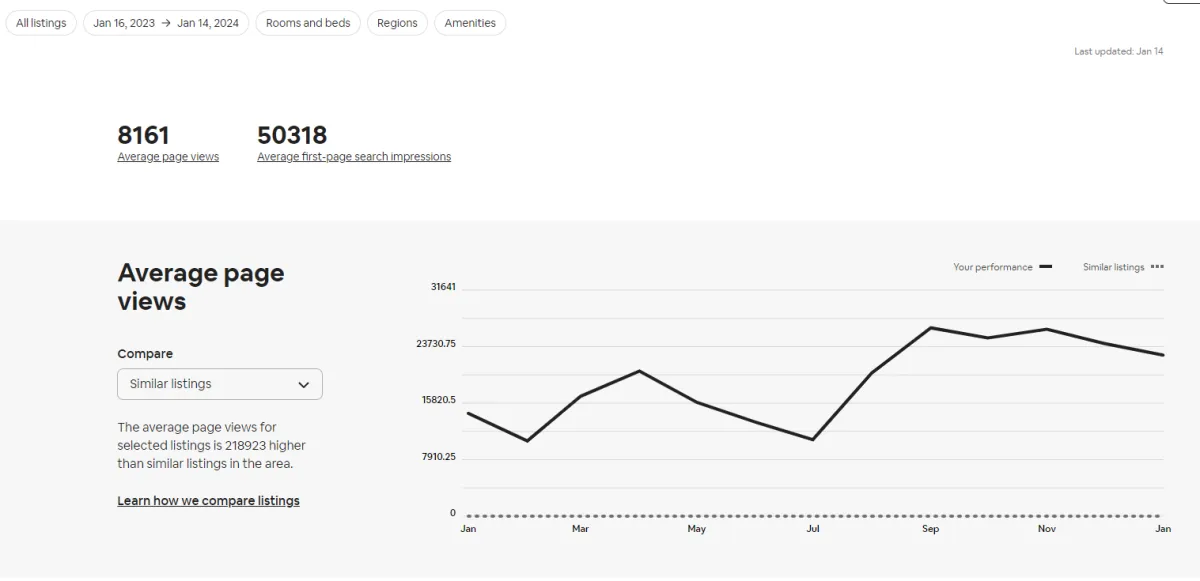Maximize ROI Through Strategic Vacation Rental Management with BNB Monthly
Unlock the full potential of your property investments. Our strategic approach focuses on increasing rental income, increasing occupancy, and maintaining property value.
WE GET RESULTS

At BNB Monthly, we are passionate about the optimization of your listing and it's ability to be seen. Ensuring your listing is on the first page of the Airbnb platform is exactly how we outperform the competition by 218,000+ views on average over the last 12-months.
The reason this is important is due to the higher view count which leads to greater opportunity for conversions (aka 'the bookings') and ultimately your properties ability to make more money. With our revenue optimization techniques, your property will soar above the competition and provide you as the investor.
Lisa J.

I've been with BNB Monthly for managing my short term rental for over a year now, and I'm thrilled with the service. The team has been nothing short of fantastic. They've taken the stress out of managing my property, and it's been smooth sailing ever since.
What I appreciate the most is their attention to detail. From ensuring the place is spotless after each guest to handling all the nitty-gritty details, they go above and beyond. Communication has been excellent; they keep me updated without me having to ask.
I can confidently say that my rental property is in good hands with BNB Monthly. If you're a property owner looking for a hassle-free experience, I highly recommend them!
Mike S.

Working with BNB Monthly has been a game-changer for my short term rental. I've been with them for several months now, and I couldn't be happier. The team is not just professional; they're genuinely passionate about ensuring my property succeeds.
They've helped optimize my listing, implemented smart pricing strategies, and it's reflected in the bookings. I feel like they truly care about the success of my property. Any concerns I've had were addressed promptly, and their proactive approach to management is refreshing.
BNB Monthly has exceeded my expectations, and I look forward to continuing our partnership. If you want a team that genuinely cares about your property's success, look no further.
FAQS
What locations do you operate in?
At BNB Monthly, we're proud to offer our short term rental management service nationwide! Whether you have a property in bustling city centers, serene suburbs, or scenic rural areas, we've got you covered. Our services extend across the entire country, ensuring that property owners from coast to coast can benefit from our professional and reliable management.
What is your fee structure?
At BNB Monthly, we believe in transparency and simplicity when it comes to our fee structure. We charge a straightforward 18% commission on the rental income, and that's it. No hidden fees, no onboarding fees – just a clear and inclusive rate for our comprehensive short term rental management services.
Is there a minimum contract period for your services?
While there is no strict minimum contract period with BNB Monthly, we do require a 90-day notice in advance if you decide to discontinue our services. This ensures a smooth transition and allows us to wrap up any ongoing management tasks effectively. We believe in providing flexibility while maintaining transparency in our partnership.
How do you handle guest communication and support?
We take care of all guest communication, from inquiries to check-ins and check-outs. Our team ensures a seamless and positive experience for your guests, addressing any concerns promptly.
How do you handle maintenance and repairs?
We coordinate with trusted vendors to ensure your property is well-maintained. Any necessary repairs or maintenance tasks are handled promptly to keep your property in top condition.
